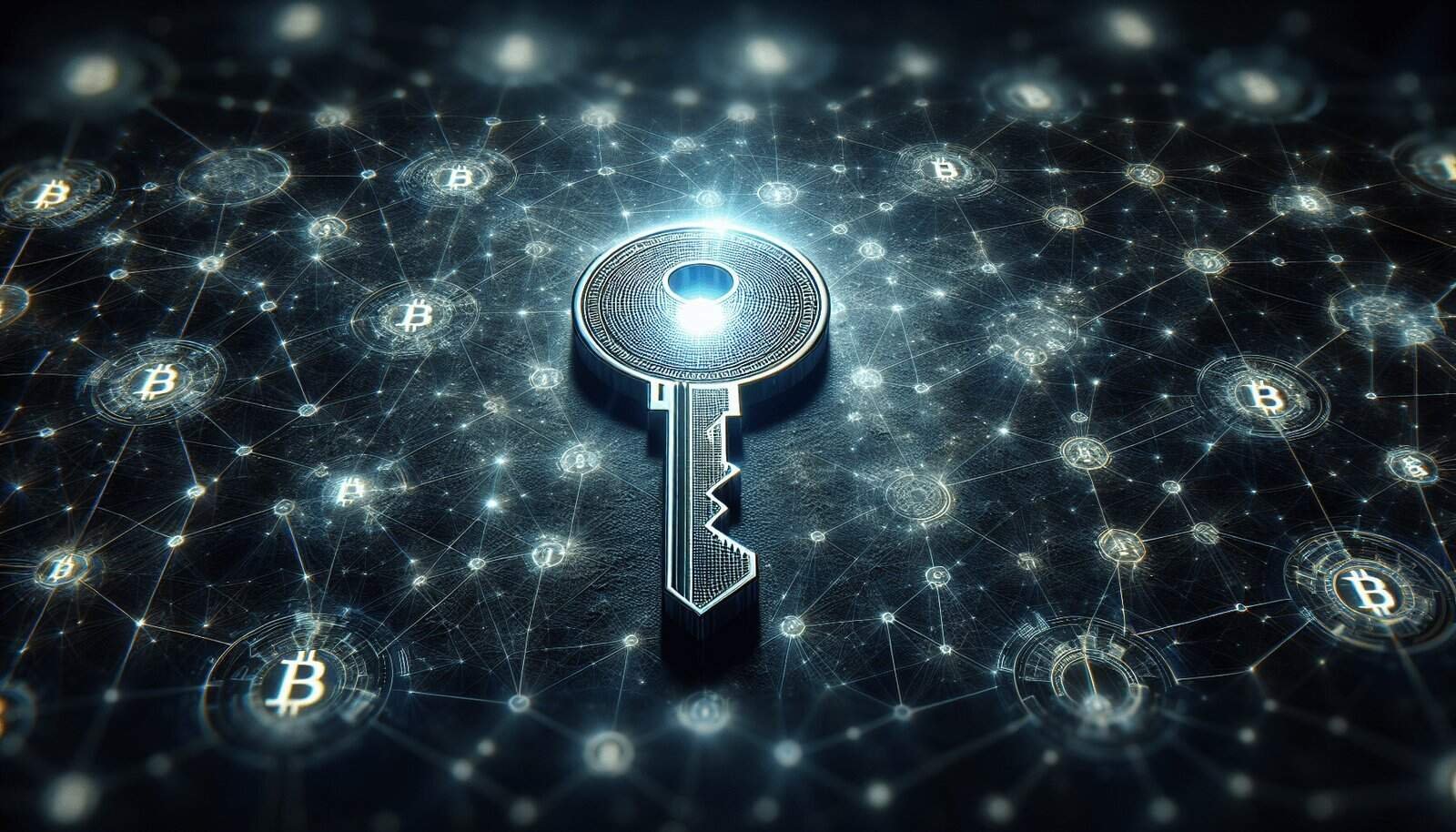Have you ever wondered what a private key is in the world of cryptocurrency? If you’re stepping into the vibrant and somewhat mysterious world of crypto, understanding the function and importance of a private key is essential. In this guide, we’ll unravel this concept for you, demystifying what a private key is and why it’s the key to your crypto kingdom.
What is a Private Key?
A private key in the realm of cryptocurrency is akin to a secret code that allows you to access your digital assets. It’s a sophisticated form of cryptography that keeps your cryptocurrency secure. The private key is a string of alphanumeric characters, generated randomly, that corresponds to your wallet address. Think of it as the password to your bank account—only more complex and secure.
How Does a Private Key Work?
When you create a cryptocurrency wallet, it constructs a pair of keys that include a public key and a private key. The public key can be shared with anyone, serving as the address where other people can send you cryptocurrency. However, the private key, which should be kept secret, is what you use to sign transactions. It proves that you own the cryptocurrency linked to the public key, thereby authorizing the transaction.
Role of Cryptography in Private Keys
Cryptography is central to the concept of private keys. The use of complex mathematical algorithms ensures that your keys are secure. Cryptography helps in transforming your data into secure code that is unreadable to unauthorized users. This involves public-key cryptography, which ensures that even if someone knows your public key, without the private key, they cannot access your funds.
Why is a Private Key Important?
Your private key is crucial for several reasons. Primarily, it acts as the proof of ownership of any cryptocurrency that is associated with your wallet. Without the private key, no one can access your digital assets—not even you. Therefore, safeguarding your private key is paramount to prevent unauthorized access and potential loss of cryptocurrency.
Ownership and Control
The private key is what gives you ownership and control over your cryptocurrency. In essence, if you own the private key, you own the cryptocurrency. If you lose your private key, unfortunately, you also lose access to your assets. There is no recovery option for a lost or forgotten private key, as cryptocurrencies like Bitcoin are built on decentralization, meaning there is no central authority to retrieve your key for you.
Security Aspects
Private keys play a pivotal role in the security of your assets. They use a combination of advanced algorithms to generate keys that are virtually impossible to guess. Ensuring that these keys remain confidential is fundamental to maintaining the integrity of your cryptocurrency holdings. Implementing security measures such as two-factor authentication (2FA), hardware wallets, and secure backups can help protect your private key.

Different Forms of Private Keys
Private keys can manifest in various forms, each with unique characteristics and implications for security. Understanding these different formats can help you make informed decisions about how you wish to manage and protect your private keys.
Hexadecimal Keys
Hexadecimal format is the oldest and simplest form of private key representation, made up of a string of numbers and letters. Hex keys are typically 64 characters long, making them quite secure. Although they are straightforward, the lack of user readability can be a drawback for those not acquainted with cryptographic concepts.
Wallet Import Format (WIF)
The Wallet Import Format (WIF) is a more user-friendly representation of a private key. Encoded in base58, WIF keys typically have a length of around 51 characters. This encoding makes the key easier to read and manage, thereby reducing the likelihood of errors when copying them or entering them into a wallet interface.
Seed Phrases
Seed phrases, also known as recovery phrases, are a series of words generated by your wallet that can be used to recover your funds. They are a human-readable representation of your private key. Seed phrases are usually composed of 12, 18, or 24 words and should be written down and stored securely. They offer a practical advantage because they are easier to remember and manage than long strings of characters.
Best Practices for Securing Your Private Key
Securing your private key is as crucial as understanding what it is. Effective management and protection of your private keys can safeguard you from losing your digital assets to hacks or accidental loss.
Offline Storage Solutions
One of the safest methods to store your private key is offline, also known as cold storage. This involves keeping your key on a device that isn’t connected to the internet, like a hardware wallet or even a simple piece of paper stored in a safe place. This significantly reduces the risk of online attacks such as hacking or phishing.
Hardware Wallets
Hardware wallets are physical devices that store your private key securely. These wallets are immune to computer viruses that try to steal private keys from software wallets stored on your computer. While slightly more costly, hardware wallets provide a high level of security, as they are designed to keep your private key isolated from potential network threats.
Paper Wallets
A paper wallet involves printing out your private key and doing nothing else. It’s a physical copy of your key. Although it might sound primitive, it’s effective for keeping your private key away from digital threats. However, you must ensure it’s stored in a secure location, as anyone with access to your paper wallet can potentially access your funds.

Common Myths About Private Keys
There are several misconceptions about private keys that could potentially mislead new cryptocurrency users. Let’s dispel some of these myths to provide a clearer picture.
Myth: Private Keys and Public Keys Are Interchangeable
A common mistake is thinking that private keys and public keys can be used interchangeably. While they are related, their functions are distinct. The public key acts as an address to receive funds, while the private key is used to authorize transactions, which means it should never be shared.
Myth: Generating a Private Key is Too Complex
Many believe that the process of generating a private key is too complicated for average users. However, most modern cryptocurrency wallets will automatically generate a secure private key for you when you create an account, simplifying the process considerably.
Myth: You Don’t Need to Worry About Private Keys with Exchange Wallets
Storing cryptocurrencies on exchanges might seem like an easy option, but it implies that you aren’t in control of your private key and therefore not in control of your funds. If the exchange faces a hack or shuts down, there’s a risk of losing your assets.
Troubleshooting and Recovery
While maintaining private keys, you may face certain challenges or potential mishaps, including loss or compromised keys. Let’s explore how to handle and possibly recover from these scenarios.
Recovering Lost Keys
Unfortunately, recovering a lost private key is next to impossible. This is why backup practices, like storing your seed phrase securely, are crucial. If you have your seed phrase, you often can recover your wallet and access your funds.
Handling Compromised Keys
If you suspect that your private key has been compromised, the first step is to move your funds to a new wallet with a newly generated private key immediately. It’s also imperative to analyze and enhance your security practices to prevent future vulnerabilities.
Measures to Prevent Loss
To prevent losing access to your keys, regular backups and using multiple forms of storage (like hardware wallets and secure digital backups) are effective strategies. Keeping updated with the latest security practices is also beneficial.

Future of Private Key Security
The future holds several promising technological advancements aimed at bolstering the security of private keys and cryptocurrencies. Innovations like multi-signature wallets, biometric encryption, and advancements in blockchain technology offer intriguing possibilities.
Multi-Signature Wallets
Multi-signature wallets require multiple keys to access funds, adding an extra layer of security. This approach means that even if one key is compromised, without the other keys, the funds remain secure.
Biometric Encryption
Biometric technologies such as facial recognition or fingerprint scanning may present future alternatives to traditional private key storage methods. This innovation would increase user-friendliness while maintaining high security levels.
Advances in Blockchain Technology
Blockchain technology itself is continuously evolving, with new protocols and enhancements being developed to improve security measures, including those related to private key management.
In conclusion, understanding and managing your private key is fundamental to maintaining both ownership and security of your cryptocurrencies. Taking the time to learn about private keys can make your crypto journey more secure and empowering, ensuring that your digital assets are protected now and in the future.

